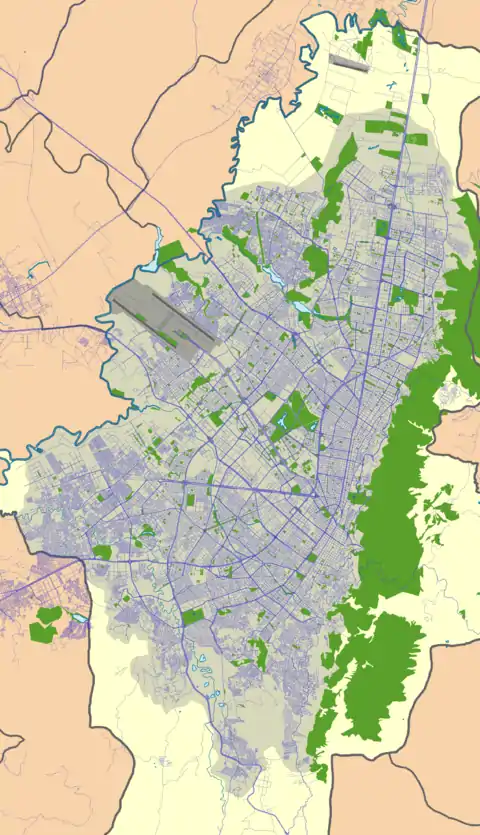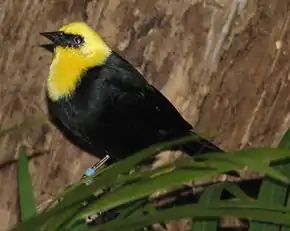Guaymaral y Torca
Guaymaral y Torca (Spanish: Humedal Guaymaral y Torca) is a combined wetland, part of the Wetlands of Bogotá, located in the north of the Colombian capital in the localities Suba and Usaquén, Bogotá, Colombia. The wetlands on the Bogotá savanna cover an area of about 73 hectares (180 acres). Guaymaral y Torca, the northernmost wetlands of Bogotá at the foot of the Eastern Hills, is composed of three parts, Guaymaral in the west in Suba (49 hectares (120 acres)), Torca in the east in Usaquén (24 hectares (59 acres)) and a small strip along the dividing Autopista Norte between the two main wetlands. The wetlands are located in the Torca River basin.[1][2][3] The Autopista Norte was constructed in 1952, dividing the wetlands.[4]
| Guaymaral y Torca Humedal Guaymaral y Torca | |
|---|---|
 Location in Bogotá | |
| Location | Suba & Usaquén, Bogotá |
| Coordinates | 4°48′17.7″N 74°02′27.8″W |
| Area | 73 ha (180 acres) |
| Elevation | 2,547 m (8,356 ft) |
| Designated | September 2003 |
| Named for | Chibcha: Guaimaro, Torca |
| Administrator | EAAB - ESP |
| Website | Humedal Guaymaral Humedal Torca |
Etymology
.JPG.webp)
The word Guaymaral is derived from the Chibcha name for Brosimum utile, guaimaro, cultivated by the indigenous people in the Valle de Upár and the Muzo.[5] Torca is named after the Torca River.
Flora and fauna


Flora
Flora registered in Guaymaral y Torca are among others Pennisetum clandestinum, Salix humboldtiana, Ulex europaeus, Schonoplectus californicus, Galium ascendens, Bidens laevis, Ludwigia peploides, Azolla filiculoides, Holcus lanatus, Eichhornia crassipe, Typha domingensis, Rumex conglomeratus, Alnus acuminata, Baccharis cf. latifolia, Polygonum sp., Eleocharis sp., Carex sp., Rubus sp., Cuphea sp..[6] Also Hydrocotyle ranunculoides, Lemna minor, Typha latifolia and Juncus bogotensis have been noted.[7]
Fauna
- Mammals
A mammal present in the wetland is the Bogotá savanna guinea pig species Cavia anolaimae.[6]
- Amphibians
Amphibians registered are among others the green dotted treefrog (Hyla labialis) and the cream-backed poison frog (Colostethus subpunctatus).[6]
- Birds
In Guaymaral, 43 and in Torca 24 bird species have been registered.[8][9]
Birds spotted are among others the saffron finch (Sicalis flaveola), yellow-billed cuckoo (Coccyzus americanus), and yellow-hooded blackbird (Chrysomus icterocephalus bogotensis).[4]
See also
References
- (in Spanish) Humedal Guaymaral website
- (in Spanish) Humedal Torca website
- Moreno et al., s.a., p.21
- (in Spanish) Aves el en separador del humedal Torca-Guaymaral
- (in Spanish) Plantas cultivadas y animales domésticos equinoccial I - Capítulo VI - Frutos y semillas (Juglandaceas a Sapindaceas) - Banco de la República
- (in Spanish) Historia de los Humedales
- Moreno et al., s.a., p.22
- Andrade & Benitez, s.a., p.8
- Andrade & Benitez, s.a., p.11
Bibliography
- Andrade L., Martha Esperanza, and Henry Benitez Castañeda. s.a. Los Humedales de la Sabana de Bogotá: Área Importante para la Conservación de las Aves de Colombia y el Mundo, 1-38. AICAS. Accessed 2017-03-03.
- Moreno, Vanesa; Juan Francisco García, and Juan Carlos Villalba. s.a. Descripción general de los humedales de Bogotá D.C., 1-28. Sociedad Geográfica de Colombia. Accessed 2017-03-03.
Further reading
- Poloche Rojas, Viglemira. 2015. Revisión de la documentación existentes sobre las áreas de protección de la zona de influencia del Río Frío en Chía y Río Torca en el norte de Bogotá (B.A.), 1-18. Universidad Militar Nueva Granada. Accessed 2017-03-03.
External links
- (in Spanish) Fundación Humedales de Bogotá
- (in Spanish) Conozca los 15 humedales de Bogotá - El Tiempo

.svg.png.webp)